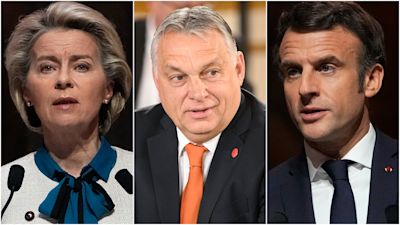EU sanctions will not ban Russian oil and gas imports until 2027

European Union sanctions against Moscow will not include a ban on Russian gas and oil, Hungary's leader has said, with other EU leaders keen on blocking Russian energy by 2027.
The bloc has joined the UK and EU in hitting Russia with hundreds of sanctions, on banks and individuals among other entities, but it has not been able to agree a ban on Russian energy imports comparable to its Western allies.
Ukrainian President Volodymyr Zelenksyy has been pleading with countries around the world to ban all imports of Russian gas and oil and a way to starve Vladimir Putin of the funds needed to finance his war machine.
But, following a meeting of EU leaders in France - arranged to discuss how to toughen the response to Putin's invasion of Ukraine - Hungarian Prime Minister Viktor Orban told his social media followers that would not be happening.
In a video message he accepted the war in Ukraine "would drag on,” but that “the most important issue was settled in a way that was favorable to us.”
“There will be no sanctions covering oil and gas, which means that Hungary’s energy supply is guaranteed for the next period,” Mr Orban said.
Mr Orban, who is considered Putin's closest ally in the EU, has so far supported the raft of sanctions placed on Russia, but Hungary - along with several other European countries - is reliant on Russian energy, making European consensus on oil and gas imports hard to reach.
But European Commission President Ursula von der Leyen said the EU must get "rid of our dependency on Russian fossil fuels", with hopes of reducing use of Russian energy by two thirds within a year, and entirely by 2027.
"By the end of May we will propose to phase out our dependency on Russian gas, oil and coal by 2027," Ms von der Leyen said after the press conference.
She claimed reducing usage by two thirds in a year would be "doable" but “it’s not going to be easy, it’s going to be hard. As I’ve already said, it needs the support of everybody".
Who are the Brits trying to fight in Ukraine and could they do more harm than good? Listen to our podcast:
Meanwhile, President Zelenskyy gave an optimistic message when addressing Ukrainians in a video showing him outside the presidential administration in Kyiv.
“It’s impossible to say how many days we will still need to free our land, but it is possible to say that we will do it because ... we have reached a strategic turning point," he said, however he did not elaborate on what he meant.
And Moscow has claimed there were signs of some kind of breakthrough in diplomatic talks being held between Russia and Ukraine.
At a Kremlin meeting with Belarusian President Alexander Lukashenko, Putin said negotiators from both nations were meeting regularly and there had been "certain positive shifts" in talks.
Despite this, a Ukrainian official said that Russian forces had attacked a psychiatric hospital near the city of Kharkiv.
Oleg Sinegubov, head of the government administration of Kharkiv, said the enemy "again carried out a brutal attack on civilians" which he described as a war crime.